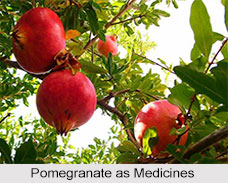 Pomegranate, botanically known as Punica Granatuh is indigenous to North Western India. The fresh juice of the fruits is much used as an ingredient of cooling and refrigerant mixtures and of some medicines for dyspepsia. The rind of the fruit is used as an astringent in diarrhoea. In the Pharmacographia, it is stated that the use of the root-bark as an anthelmintic by the Hindus attracted the notice of Buchanan at Calcutta about the year 1805. This physician pointed out the efficacy of the root-bark which was further shown by others.
Pomegranate, botanically known as Punica Granatuh is indigenous to North Western India. The fresh juice of the fruits is much used as an ingredient of cooling and refrigerant mixtures and of some medicines for dyspepsia. The rind of the fruit is used as an astringent in diarrhoea. In the Pharmacographia, it is stated that the use of the root-bark as an anthelmintic by the Hindus attracted the notice of Buchanan at Calcutta about the year 1805. This physician pointed out the efficacy of the root-bark which was further shown by others.
Dose of Pomegranate in Medicine
Dadimashtaka: Take pomegranate rind one seer, bamboo-manna 2 tolas, cardamom, cinnamon, tejapatra and flowers of Mesua ferrea (nagakesara), each 4 tolas, ajwain, coriander, cumin seeds, long pepper root, long pepper, black pepper and ginger, each 8 tolas and sugar 1 seer. Powder the ingredients and mix. Dose should be about one drachm in chronic bowel complaints.
This article is a stub. You can enrich by adding more information to it. Send your Write Up to content@indianetzone.com
Related Articles
Ayurveda
Origin of Ayurveda
Ayurveda Medication
Elements of Ayurveda
Concepts of Ayurveda
Ancient Literature of Ayurveda
Sushruta Samhita





